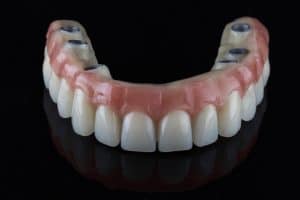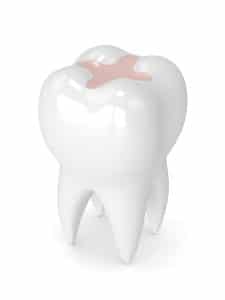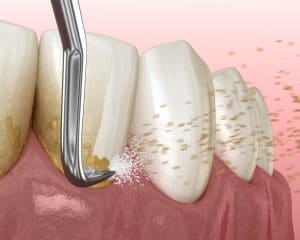 Decay is one of the most common dental concerns that nearly everyone experiences at some point or another, usually in the form of a cavity. When caught early on, cavities can be easily addressed with a dental filling, and you can resume your normal function quickly and efficiently. In other cases, however, decay can be ignored and allowed to spread, causing significant damage to a tooth that, after reaching a certain point, would render a restoration useless. In today’s blog, your Dallas, TX dentist looks at the point when an extraction is needed to prevent damage to your oral health, and how dental implants can complete your smile once again.
Decay is one of the most common dental concerns that nearly everyone experiences at some point or another, usually in the form of a cavity. When caught early on, cavities can be easily addressed with a dental filling, and you can resume your normal function quickly and efficiently. In other cases, however, decay can be ignored and allowed to spread, causing significant damage to a tooth that, after reaching a certain point, would render a restoration useless. In today’s blog, your Dallas, TX dentist looks at the point when an extraction is needed to prevent damage to your oral health, and how dental implants can complete your smile once again.
Restoring Your Grin with a Tooth-Colored Filling
 While you may be routinely brushing and flossing, other factors can contribute to the development of cavities, infection, and more. For instance, your diet plays a major role, as many foods contain high levels of acidity that can actively work to break down the natural enamel present on the front of your teeth, your smile’s only true defense mechanism. Indeed, fruits, sweets, certain beverages, and more all work against your grin, breaking down your tooth’s structure and allowing infection to set in that will require intensive treatments such as a root canal to address. In this week’s blog, your Dallas, TX dentist looks at staying on top of your oral health by treating minor cavities with a filling before they get worse.
While you may be routinely brushing and flossing, other factors can contribute to the development of cavities, infection, and more. For instance, your diet plays a major role, as many foods contain high levels of acidity that can actively work to break down the natural enamel present on the front of your teeth, your smile’s only true defense mechanism. Indeed, fruits, sweets, certain beverages, and more all work against your grin, breaking down your tooth’s structure and allowing infection to set in that will require intensive treatments such as a root canal to address. In this week’s blog, your Dallas, TX dentist looks at staying on top of your oral health by treating minor cavities with a filling before they get worse.
What a Deep Clean Does for Your Grin
 Routine preventive care consists of routine brushing and flossing at home, while also attending checkups at least once every six months. If these practices are followed, ideally, most major dental concerns can be prevented and you do not have to live in fear of tooth loss. Every once in a while, however, our grins can use a little boost as oral bacteria nestle in the hard-to-reach areas and cause harm. Fortunately, your Dallas, TX dentist at Gentle Smiles Family Dentistry can help you remove those dangers and help prevent them from causing further harm with a deep clean.
Routine preventive care consists of routine brushing and flossing at home, while also attending checkups at least once every six months. If these practices are followed, ideally, most major dental concerns can be prevented and you do not have to live in fear of tooth loss. Every once in a while, however, our grins can use a little boost as oral bacteria nestle in the hard-to-reach areas and cause harm. Fortunately, your Dallas, TX dentist at Gentle Smiles Family Dentistry can help you remove those dangers and help prevent them from causing further harm with a deep clean.
Don’t Overlook Gum Care When You Brush
 Teeth are an important part of your smile, but they can’t do it alone! Every smile depends on the work of facial muscles, lips, and gums. When your gums are not healthy, the whole smile will suffer, not just in the way it looks, but unhealthy gums have been linked to heart problems, diabetes, stroke and more. Good gum care should be a part of those twice-daily brushing sessions you are doing at home. Flossing daily also helps gums stay healthy. Finally, your twice yearly preventive visits to your Dallas, TX, dentist let our staff check your gum health as well. (more…)
Teeth are an important part of your smile, but they can’t do it alone! Every smile depends on the work of facial muscles, lips, and gums. When your gums are not healthy, the whole smile will suffer, not just in the way it looks, but unhealthy gums have been linked to heart problems, diabetes, stroke and more. Good gum care should be a part of those twice-daily brushing sessions you are doing at home. Flossing daily also helps gums stay healthy. Finally, your twice yearly preventive visits to your Dallas, TX, dentist let our staff check your gum health as well. (more…)
How to Salvage an Infected Tooth
 Tooth infections, like most infections, become more serious over time. In many cases, your body is able to fight off minor infections on its own. Tooth infections are different in this regard. A tooth infection, characterized initially by a cavity, will not get better with time. In fact, it will get worse. Only by taking action and visiting your dentist can you reverse the course of your oral health. A treatment like root canal therapy can actually salvage an infected tooth. Here’s how this treatment works, and when you might need to utilize it. (more…)
Tooth infections, like most infections, become more serious over time. In many cases, your body is able to fight off minor infections on its own. Tooth infections are different in this regard. A tooth infection, characterized initially by a cavity, will not get better with time. In fact, it will get worse. Only by taking action and visiting your dentist can you reverse the course of your oral health. A treatment like root canal therapy can actually salvage an infected tooth. Here’s how this treatment works, and when you might need to utilize it. (more…)
Treating TMJ Disorder And Bruxism

When our jaw joints undergo excess strain, we could develop serious complications that cause discomfort and could even damage your smile. In today’s blog, your Dallas, TX, dentist will look at how we identify and treat TMJ disorder and bruxism with a custom-made and comfortable oral appliance.
The Importance of Taking Care of Tiny Smiles
 Bacteria naturally occur and affect all smiles, but if left unmanaged, harmful bacteria can grow, spread, and cause potentially detrimental effects. While you may have instilled that having a healthy grin starts with consistent brushing and flossing habits at home to protect from harmful bacteria, it is crucial that regular checkups and cleanings re not missed either. In fact, we recommend attending a routine dental visit at least once every six months, and this goes for tiny grins as well. At Gentle Smiles Family Dentistry in Dallas, TX, your family’s comfort and well-being are our top concerns, and we offer routine preventive care to make sure all teeth are at their best.
Bacteria naturally occur and affect all smiles, but if left unmanaged, harmful bacteria can grow, spread, and cause potentially detrimental effects. While you may have instilled that having a healthy grin starts with consistent brushing and flossing habits at home to protect from harmful bacteria, it is crucial that regular checkups and cleanings re not missed either. In fact, we recommend attending a routine dental visit at least once every six months, and this goes for tiny grins as well. At Gentle Smiles Family Dentistry in Dallas, TX, your family’s comfort and well-being are our top concerns, and we offer routine preventive care to make sure all teeth are at their best.
What to Do When You Experience Tooth Loss
 When you experience the loss of one or more of your natural teeth, the impacts that the loss can have on your oral health may not always be immediately noticeable. While you may notice the change in your smile’s appearance right away, it can take time before the results of the loss begin to show themselves. For example, after losing a tooth, your dental ridge can change in different ways, and your remaining natural teeth can be at a greater risk of becoming compromised. Today, we examine what you should know about tooth loss, and what you should do to preserve your smile if you experience it. (more…)
When you experience the loss of one or more of your natural teeth, the impacts that the loss can have on your oral health may not always be immediately noticeable. While you may notice the change in your smile’s appearance right away, it can take time before the results of the loss begin to show themselves. For example, after losing a tooth, your dental ridge can change in different ways, and your remaining natural teeth can be at a greater risk of becoming compromised. Today, we examine what you should know about tooth loss, and what you should do to preserve your smile if you experience it. (more…)
When Should a Tooth Be Crowned?
 Deciding on the right treatment for any type of dental concern requires a careful diagnosis from your dentist, and sometimes, you may be surprised at what your dentist recommends. For example, in many cases, modern dental crowns can accomplish a lot more than many patients expect, from fully restoring a severely damaged tooth to improving the overall appearance of an extensively blemished one. Today, we look at a what a custom-designed dental crown can accomplish, and when it might be the best solution for your tooth. (more…)
Deciding on the right treatment for any type of dental concern requires a careful diagnosis from your dentist, and sometimes, you may be surprised at what your dentist recommends. For example, in many cases, modern dental crowns can accomplish a lot more than many patients expect, from fully restoring a severely damaged tooth to improving the overall appearance of an extensively blemished one. Today, we look at a what a custom-designed dental crown can accomplish, and when it might be the best solution for your tooth. (more…)
Why It’s Important to Fill a Cavity Early
 Cavities can affect nearly anyone, but fortunately, they can usually be treated with a minimally invasive treatment such as a tooth filling before they become severe. While dealing with a cavity may be simple at first, however, it doesn’t take long for the tooth decay behind it to grow worse, and for the cavity to grow larger as a result. Today, we explain why it’s important to fill a cavity in its early stages, and what treating your tooth could mean if you procrastinate. (more…)
Cavities can affect nearly anyone, but fortunately, they can usually be treated with a minimally invasive treatment such as a tooth filling before they become severe. While dealing with a cavity may be simple at first, however, it doesn’t take long for the tooth decay behind it to grow worse, and for the cavity to grow larger as a result. Today, we explain why it’s important to fill a cavity in its early stages, and what treating your tooth could mean if you procrastinate. (more…)






Recent Comments